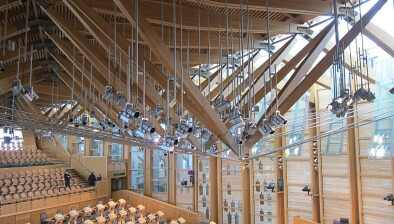Sector welcomes Programme for Government

The Scottish Government’s priority for warm homes has “lit up” the Programme for Government and been welcomed across the sector.
The Existing Homes Alliance said welcome detail on the new Scotland’s Energy Efficiency Programme (SEEP) will deliver the Scottish Government’s commitment to a National Infrastructure Priority on energy efficiency to tackle fuel poverty and climate change.
For the Alliance, the £10bn pledged to SEEP also unveils the scale of the programme.
An additional £20 million of Brexit stimulus funds will be spent on energy efficiency programmes, bringing overall spending on energy efficiency to £500m over the next four years and providing a boost to local economies and communities. Although this multi-year commitment is welcome, the Alliance warned this represents a small increase on current funding and will fall far short of realising projected £10bn investment required.
A further welcome announcement for the Alliance is the intention to consult on regulations to drive uptake of energy efficiency in private rented housing, as well as phased regulation of existing buildings. Encouraging everyone to invest in their homes will be crucial to achieving the overall investment needed to tackle fuel poverty and reduce climate emissions, it added.
The Existing Homes Alliance has estimated that a total of £4.5bn of public investment will be required to virtually eliminate energy efficiency as a driver for fuel poverty and meet climate targets. It believes the SEEP should aim for the vast majority of homes to reach at least an Energy Performance Certificate (EPC) band C by 2025.
This, it argues, would benefit 1.5million households, help reduce energy bills, cut the nation’s carbon emissions, reduce NHS costs of treating illnesses related to cold and damp homes, and create up to 9,000 new jobs spread across Scotland. This objective is also supported by more than 50 major civil society organisations.
Alan Ferguson, chair of the Existing Homes Alliance, said: “It is great news the government has decided to make tackling fuel poverty and driving up the energy performance of our homes a priority in the Programme for Government. People in Scotland shouldn’t be suffering from fuel poverty because it’s too expensive to keep their home warm.
“We agree the overall cost of the programme will be £10bn to virtually eliminate energy efficiency as a driver of fuel poverty and meet our climate targets. This means two things – we’ll need more investment from the public sector, as well as fair and reasonable regulation of the whole private sector housing stock – providing those in private housing the benefits of a warm and affordable to heat home that social housing tenants have enjoyed for years – thanks to regulation.
“This is not just about fuel poverty and climate change - a multi-billion pound investment in energy efficiency can delivery excellent value for money as a stimulus project – research estimates it will have a benefit to cost ratio of 2:1 – with direct impacts on people’s well-being, employment and energy costs throughout Scotland.
“The Alliance looks forward to working with government and opposition parties on a shared ambition for all Scots to enjoy the benefits of living in a warm, dry home.”
The Scottish Federation of Housing Association (SFHA) welcomed the proposed Housing (Amendment) Bill, Social Security Bill and Warm Homes Bill announced yesterday by First Minister Nicola Sturgeon.
These bills, it said, will all help to support the delivery of 50,000 affordable homes over the next five years.
The Federation also welcomed the confirmation that £3 billion will be provided to support the development of the new affordable homes target.

Andrew Jackson, head of public affairs, SFHA, said: “We continue to work with the Scottish Government and other partners to ensure that RSLs can play their part in the achievement of the Scottish Government’s ambitious 50,000 affordable homes target which will help to solve Scotland’s current housing crisis.
“We are pleased that the Social Security Bill will see the abolition of the ‘bedroom tax’ alongside a number of other welfare policies which have been counterproductive in supporting social tenants.”
Andrew Jackson added: “We also welcome the introduction of a Warm Homes Bill and the announcement of a new Energy Strategy as there is still much work to be done in order to solve fuel poverty.
“It is of paramount importance that everyone in Scotland can have a warm, energy efficient, affordable home in order to improve their health, wellbeing and life chances, and we trust that key elements of (yesterday’s) Programme of Government will help to realise this.”
Industry body Homes for Scotland pointed to the vital role that increasing the supply of new high quality, warm and energy-efficient homes could play in achieving the First Minister’s ambition of improving education outcomes and boosting the wider economy.

Chief executive Nicola Barclay said: “With the First Minister making it clear that education lies firmly at the heart of this new Programme for Government, it is crucial that the intrinsic link between educational attainment and access to good quality housing is recognised.
“Research has highlighted that improving access to new warm, energy-efficient homes has a number of important benefits. These include significant positive effects on children’s abilities in terms of skills and education as well as contributing more widely to the establishment of sustainable communities which help these youngsters thrive. In addition, every new home built in Scotland supports four jobs, stimulating economic growth.
“Whilst we welcome the Scottish Government’s £3bn commitment to invest in affordable housing, it’s essential that we build enough homes of all tenures in order that our growing population can reach its full potential and make Scotland a better place in which to live, work and invest.
“We are encouraged by the announcements in relation to the Planning Bill which will be brought forward early in the Parliamentary session and await further details on this and the implementation of the recommendation of Simplified Planning zones and support to modernise compulsory purchase orders which would mean vacant and derelict land would be brought back into use.
“A refresh of the national strategy for housing for Scotland’s older people will also prove crucial in ensuring that people are housed in properties which are appropriate for each stage of their personal housing journey, potentially freeing up many much-needed family homes.”
Referring to the announcement of a £500 million Scottish Growth Scheme providing investment guarantees and loans for “high-growth potential companies, with clear export growth plans”, Barclay pointed to the difficulties faced by small and medium sized builders in accessing development finance and highlighted the key importance they have to play in the domestic market in increasing housing supply, calling for similar support to be made available to them.
The Royal Institution of Chartered Surveyors in Scotland said the First Minister has taken “some very welcome steps” which will help to return some much needed stability to the property and construction sectors.

RICS regional director of Scotland, Gail Hunter, added: “While confidence in these markets wobbled following the Brexit result, the Scottish Government’s Programme for Government 2016-17 has provided key policies and legislative proposals that could provide much needed certainty in an uncertain world.
“The Scottish Government has clearly recognised the emerging uncertainty that has followed the Brexit vote along with its impact on Scottish business confidence and development. The commitment to spend £4bn on infrastructure next year, along with a £500m package of support for private businesses, could go a long way to alleviate this.
“Furthermore, the development of a Scottish Rural Infrastructure Plan in 2017 is a welcome move. Prior to the election, we RICS called on the newly elected government to deliver such a plan, providing a clear strategy around greater connectivity of broadband, energy and transport. RICS stands by this appeal and calls on the Government to inject rural economies with the infrastructure required that will entice private investment to rural and remote Scotland.
“There is little detail so far behind the announcement of the Scotland Energy Efficiency Programme (SEEP) to improve the energy efficiency of buildings, but we would encourage the Scottish Government to look to the maintenance of existing stock – particularly older stock, and support for owners and tenants of these properties - in the process of developing regulations for this initiative.”

Scottish Property Federation director David Melhuish said: “The rollout of Simplified Planning Zones for housing is particularly welcome news and we hope that the Government will continue to engage with housebuilders and the development industry as well as local authorities to make use of the best practice which has emerged in places such as Hillington Park where a commercially led SPZ has been particularly successful.”
WWF Scotland director Lang Banks said: “It was great to hear the First Minister highlight the importance of Scotland’s low-carbon economy as part of her government programme. Commitments to new climate change and warm homes legislation will provide opportunities to bring forward new policies that will put us on track for securing the full benefits of a zero-carbon future. Money for energy efficiency in the First Minister’s post EU Referendum stimulus package is a welcome recognition that tackling cold homes can create jobs, boost the economy and cut our climate emissions.”
Commenting on action to secure warm homes, Banks said: “With thousands of families across the nation wasting cash and carbon heating leaky homes, it’s good to see more detail on Scottish Government’s plans to improve energy efficiency. New funding, a commitment to consult on regulation, and an ambition that a total of £10bn ends up being invested in tackling cold homes, all show the government recognises action in this area is good for the economy, jobs and climate. However, the level of funding for the next five years looks to be a slow-start and little more than is invested at the moment. In advance of the budget this autumn and a forthcoming new energy strategy, we’ll be looking for more detail on this from Scottish Government.”

On plans for a new Climate Bill, Banks said: “A new Climate Bill is a very welcome commitment and we hope that MSPs from across the Parliament use it as an opportunity to bring forward new policies that help us secure the benefits of a zero-carbon future.”
Commenting on plans for a new energy strategy, Banks added: “Scotland is taking positive steps on renewables all the time, whether its breaking records or developing innovative new technology. So it’s great to hear the Scottish Government setting out plans to develop a new energy strategy that can provide confidence to investors about the future for renewables in Scotland. We’ll be calling on the Scottish Government to use the energy strategy to set a new objective of generating half of all of our energy – across electricity, heat and transport – from renewables by 2030.”
The pledge to forge ahead with a new Climate Change Bill and Energy Strategy was also welcomed by legal firm Pinsent Masons.
Energy efficiency has been identified as a national infrastructure priority and the proposed legislation is envisaged to not only meet climate change obligations but “provide investors with certainty and a clear sense of direction”.

Kate Turner, a legal director at Pinsent Masons who specialises in energy sector projects, said: “The commitment to delivering a new Climate Change plan and Energy Strategy is a positive signal to the market.
“We will need to see the detailed strategy but would like to see it address energy demand reduction through improved energy efficiency and heat measures alongside the integration of energy storage capacity in to the market, and a clear commitment to low carbon generation capacity and addressing energy use in the transport sector. These are key areas which should feature strongly in any new energy strategy for Scotland.”

Sean McLaughlin, managing director of energy efficiency specialists Matilda’s Planet, said: “It’s refreshing and heart-warming to see a strong, long-term commitment to retrofit and energy efficiency from the Scottish Government. While it is easy to talk a good game it’s invigorating that these words have been backed up by a very significant pot of money to improve the energy efficiency of homes and buildings in the commercial, public and industrial sectors.
“I met with representatives of the Scottish Government about SEEPS recently and was delighted that they were open to a more collaborative approach with the energy efficiency supply chain and were prepared to listen.
“Lack of proper engagement with the supply chain and a burning desire to reinvent the wheel has led to the ridiculously expensive failure of too many energy-efficiency programmes like the Green Deal. It’s refreshing that the Scottish Government is treading a different path and is consulting effectively.”







